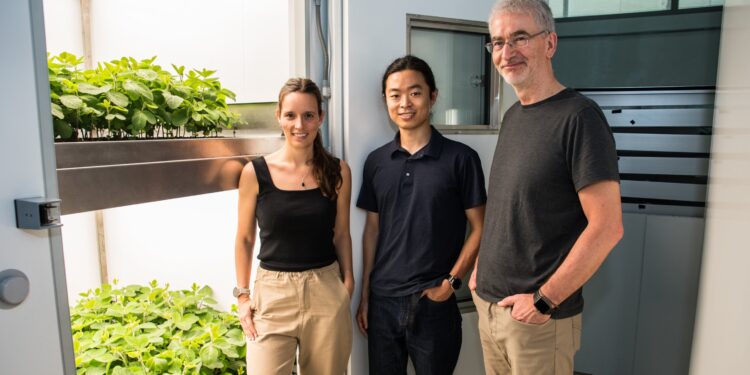Vertical agriculture team, Dr Vanesa Calvo-Baltanas, PH.D. The candidate Jooseop Park and Professor Sendhold ASENG with one of the vertical agricultural units dedicated to the cultivation of soybeans in Tumcreate, in Singapore. Credit: Israel Tan Si Lie / Tum
Vertical agriculture can do more than lettuce. A research team led by Tumcreate, a research platform in Singapore, led by the Munich Technical University (TUM), studied the culture of six food groups in vertical agriculture: cultures, algae, mushrooms, insects, fish and cultivated meat. In this study published in Nexus pnasResearchers show the positive effects of vertical agriculture on yield and environmental impact and highlight its role in future food security.
In certain circumstances, traditional agriculture reaches its limits, for example, after extreme weather events or in areas with high population density and therefore on demand. “Vertical agriculture is a precious addition here: food can be cultivated near consumers, regardless of weather and effectively using space,” said Dr. Vanesa Calvo-Bontanás, principal publication researcher, working on the Tumcrete research platform in Singapore.
In this study, she and other researchers have studied the potential of vertical agriculture for food security. The team presents theoretical estimates supported by experimental data previously published. Based on these data, researchers have established a quantitative framework to assess the potential environmental performance and environmental impact of controlled environment agriculture, such as vertical agriculture.
Urban food production with proteins4singapore
The study offers an overview of the potential of various food groups in a vertical agricultural system with 10 layers: crops, seaweed, mushrooms, insects, fish and cultivated meat. Compared to crops in the field, these foods can increase protein yield by zone almost three hundred for crops and more than 6,000 times for fungi and insects.
The results of the study show that this increase in total efficiency and protein thanks to agricultural controlled environmental systems offers advantages in environmental impact. In all food groups, controlled environmental agriculture reduces land use and eliminates the need for disease measures such as pesticides and antibiotics.
The research was carried out as part of the Proteins4Singapore project. The project aims to search for sustainable and functional proteins to provide urban areas such as Singapore. With its “30 x 30” strategy, the State aims to produce 30% of its nutritional needs locally by 2030. The results of the study confirm that vertical agriculture can present a economical part of this strategy.
Use of circular and effective resources
“The potential of vertical agriculture is far from being exhausted,” said Sendhold Asngé, professor of digital agriculture in Tum and principal principal researcher at Tumcreate.
According to the researchers, the agriculture of these new food groups vertically can have additional optimization potential in addition to their return. For example, mushrooms and insects could help close resource cycles with interior crops. They treat culture processes waste and make it available again as edible and nutritious foods.
Mushrooms and insects are also examples of foods that require little light. Cultivating these foods is particularly interesting because they reduce energy consumption and, therefore, associated costs. This overcomes the main drawback of vertical agriculture and provides precious nutrients.
Acceptance and promotion
The biggest challenges for agricultural food systems in the controlled environment are the high demand for energy required for culture and social acceptance. Certain foods that offer advantages in vertical agriculture, such as algae and insects, are not generally accepted by many consumers.
“Controlled environmental agriculture can revolutionize food production. However, technological advances, interdisciplinary research to tackle energy problems, political incentives and public engagement are necessary to achieve its full potential,” said Dr Calvo-Bontanás.
She points out that the study provides a framework for decision -makers, industry and researchers to make informed decisions for sustainable food production.
More information:
Vanesa Calvo-Bontanás et al, the future potential of controlled environment agriculture, Nexus pnas (2025). Doi: 10.1093 / PNASNEXUS / PGAF078
Supplied by Munich Technical University
Quote: Vertical agriculture can increase yields and reduce the environmental impact (2025, May 5) recovered on May 5, 2025 from
This document is subject to copyright. In addition to any fair program for private or research purposes, no part can be reproduced without written authorization. The content is provided only for information purposes.



